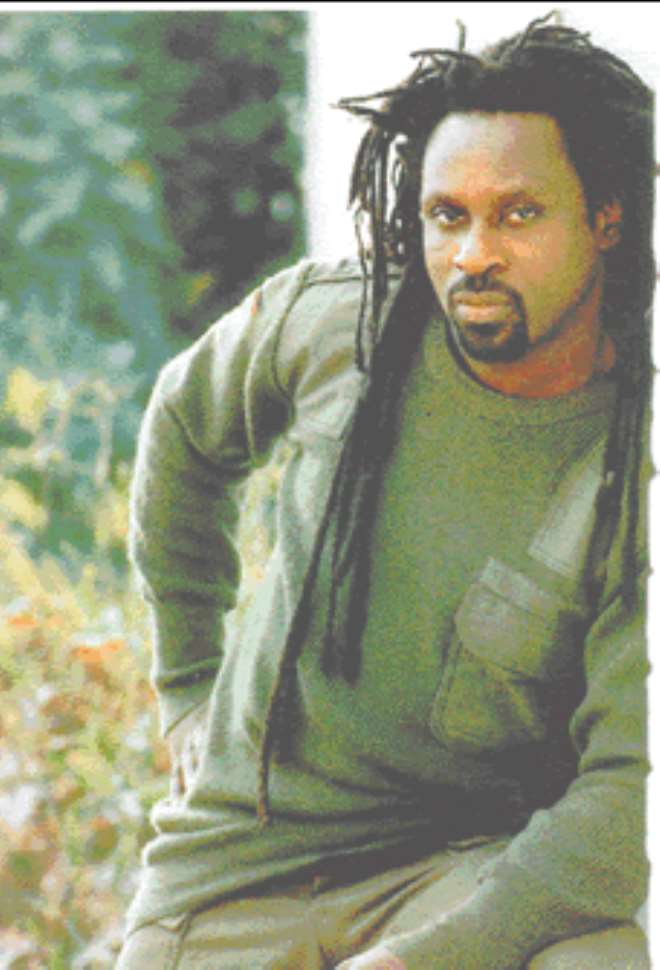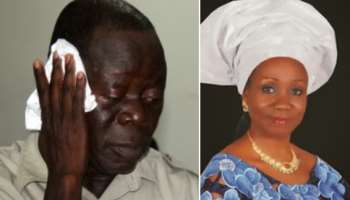I DON’T WEAR MY DREAD LOCKS FOR FASHION— VICTOR ESSIET
It was nice to run into Victor Essiet of the Madators fame weekend at the O'jez night club in Surulere. After 13 years sojour in the USA, the reggae artist with the cascading dread lock stormed the country last December with his 18 piece band and toured a few cities before returning to his base. But the man whose album like Rat race and Crises shot him into lime light in the late 80's is back in the country “to take care of some business”. Looking street wise with all the bling bling, Victor, in this interview, speaks about his home coming, the plight of the poor, and his driving force as a reggae artist.
How is life with you after such a long time from home?
Well, it's been pretty good, much better than I thought. I never thought that after such a long time from home, that when I come back, I'm going to have such a warm reception. I'm very appreciative of it.
What was the acceptance of your music like abroad?
I've been there a while now so I have a whole lot of acceptance. You know that, abroad, their response about things that they appreciate is quite different. But here, my people love me so much that, despite the long period of absence, they gave me a tremendous reception which I would value over any appreciation of my music any where in the world.
What did you miss most while you were away?
Gatherings like this where you would come and speak pidgin English. You know, in America, we are dealing with a lot of people from different nationalities from Europe, America and Asia and we don't get to speak a dialect. That is why when, at home and I say something in my local dialect, a lot of people really appreciate it. Back home, it's nice to be able to eat puff-puff, buns. I miss pepper soup. Apart from cooking it in your house, you can go out and sit with your homies and people. I kind of missed that. But it is a calling for you have certain things that you have to do. So it feels very good to be back home, even though I have not come back to stay permanently. Even though I am now a citizen of America, it feels good to be able to say, I have a place to go back to. Then, when you greet your people and you say “how you dey now? Wetin una chop remain?” that feels good and you know you are home. But in America, you can't say that to anybody because people won't understand what you are talking about.
There is a great attraction towards rap and hip-hop by the younger generation, where does that leave you as a reggae artist?
Reggae is massive. Hip hop, as it is, comes from America, and America is a one place for a whole lot of music. You have metal rock, you have hard rock, active rock, R&B, soul, grass and you have reggae. You have a whole lot of genres of music and we have so many musicians in America, Europe and the world. Each and every brand of music still sails through and each and every artist, has his or her followers, but reggae happens to be music that has had a long duration because of the content and the pattern. Reggae has the ability to stay forever. You remember, back in the 60s, when Bob Marley and the Wailers and Jimmy Cliff, Jonny Holmes and Kenny Lazarus started, it was regarded as a no impact music but reggae music has created a whole lot of consciousness in the world today.
It's the greatest music that ever has been because it's a vehicle that has the capacity to transport a whole lot of messages that can affect humanity. Reggae music is no match word to any other music and I can tell you and be ready to take on anyone who can challenge me on that. The fact that we left the country to concentrate in a foreign land doesn't mean that reggae is a music that doesn't have a place. It's the greatest music of all times. It's just like the high life.
If you look at the rate of inflation, the percentage of the poverty, the percentage of the unemployment, then, you ask, who is talking about them? Do you think the government is just going to get up and do stuffs? The government has the tendency of forgetting about the common people and we have the responsibility of letting the government know that we are not going to let it off just like that. We have to speak on behalf of the people that don't have a voice. So, reggae music replaces that and stands as a social commentary, just like the journalists in print and electronic media.
What does it take from an artist to consciously chronicle the ills of society?
It takes an artist to be of a lineage of separation and lineage of love for his people. The love of God must be embedded in him and he realises that he is not here on earth to sing and make money or glorify myself or any other person. But he is here for a purpose, therefore, I have to stand up for people who don't have a voice. So, it takes the love for the people, love of a country for one to sit down and write songs that reflects in everything you do.
How did you carve out this dread as your style?
Actually, my dread is not a style. It's a consciousness. In my family, some of us are naturally born with dread-locks. So, I keep it. It's part of me and I just let it grow. It is a sign of strength, a sign of rebellion that we are not going to accept anything but equality, love, justice, great consciousness and oneness among people in this country and in the world.
Do you identify with other people with dreadlocks when you travel to other places?
We identify, but, sometimes, its like, seeing a man or woman who speaks your language and when you approach him or her, you find out that he doesn't come from your tribe but he just happens to know the language then you back away. But, if you walk up to somebody and he speaks your language and he is from your tribe, he knows the culture and he knows the dos and don'ts, then you guys can deal. But, you don't have to hate the other one who is not from your tribe but who speaks your language and might not have the consciousness.
Is this spiritual then?
Yes, it is spiritual.
How so?
Highly spiritual because I will not sit in a place where someone will be unjust to another person. I will not be in a place where somebody is trying to cheat another person. I'm not going to be in a place where somebody is trying to oppress somebody else. All people are one people regardless of what they look like. So, this is the spiritual part of it. So, if you are not speaking that language and you are not from that tribe, then, you do not belong because my life does not mean anything if I can't stand and defend certain things that I stand for and what I stand for is justice for all and love for all people.
Isn't it a heavy cross to bear?
It's not a heavy cross to bear because, everyday, I feel bad about what is going on in the world. I came back to Nigeria and saw the level of poverty. It's a terrible thing to happen to any people with such wealth that we have. And, if nobody wants to speak about it, then, it is too bad. If I can't do anything, then, God have mercy on me. If God has mercy on me and helped me to be able to go to another country and achieve something, what about all the other suffering people? And our leaders don't see the need to stabilize the economy and create a situation where everybody can be able to have something they can live on and give them some jobs to do because God has blessed us so much in this country. So, it is a pathetic situation that we find ourselves in here and I find it very difficult to turn my head the other way.
So, you reflect all these in your songs?
Oh yes. You are going to hear what is coming out in my new album.
Does this consciousness have any peculiar sense of style?
As it is, I know that God, our heavenly Father, is a Man of style. He is an artist, a creator, He is a fashionist because if you are speaking to somebody about certain things and you don't have it, how can they imbibe it. So, it comes with a style to show that the sufferer should look like this.
It is the common one that has made the biggest thing that we have seen in our community and our society and so they should be able to live well and own beautiful things, beautiful cars, kids should go to the best schools and dress well with nice shoes and look well and that is what we represent now. It's not like in the past, when the rasters will look dirty. What are you propagating? Are you propagating that you suffer so people should stay in dirt? No. We propagate that you rise from the dirt and become like a gold.
What's your choice?
My style is just mine. I create my own style and let my shirt go with my shoes and my cuff-links go with my bling bling that is the way it goes.
Latest News
-
 "If You're For Me, I Am For You" - Cubana Chief P
"If You're For Me, I Am For You" - Cubana Chief P -
 "3 Days To Go" - Femi Adebayo Urges Fans To Get S
"3 Days To Go" - Femi Adebayo Urges Fans To Get S -
 "Stop Asking Me Questions About Speed Darlington"
"Stop Asking Me Questions About Speed Darlington" -
 "Benue Is The Most Underdeveloped State I've Ever
"Benue Is The Most Underdeveloped State I've Ever -
 Stan Alieke Urges Young Professionals To Take Lin
Stan Alieke Urges Young Professionals To Take Lin -
 Chizzy Alichi Teases Fans With Baby Reveal, Promot
Chizzy Alichi Teases Fans With Baby Reveal, Promot -
 "I'm Not Wearing Makeup From July 4th Till Decemb
"I'm Not Wearing Makeup From July 4th Till Decemb -
 "Stop The Challenge Of Mocking Kids With Down Syn
"Stop The Challenge Of Mocking Kids With Down Syn -
 Regina Daniels Celebrates Sons As They Mark Birthd
Regina Daniels Celebrates Sons As They Mark Birthd -
 Speed Darlington Threatens To Sue NAPTIP For Defam
Speed Darlington Threatens To Sue NAPTIP For Defam














